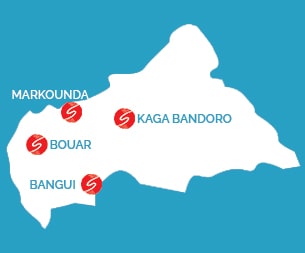
Context
These crises have compounded the country’s existing structural weaknesses and under-investment in infrastructure. Political and military instability continued, despite the fact that the government has greater control over its territory and is attempting to decentralize its administration.
In 2022, 3.1 million people, in every community and region of the country, needed humanitarian assistance — over 50% of the population. These needs were exacerbated by the impact of the Ukrainian crisis, which pushed up the prices of essential items and fuel. This increase in the cost of living has made the population — one of the poorest in the world — even poorer.
- 6.1 million inhabitants
- 188th out of 191 countries on the Human Development Index
Our action

-
Mission
opened in 2006 -
Team
21 international staff
141 national staff - Budget 6.92M€
Our teams provided over 80,000 people with emergency assistance in remote and difficult-to-access areas. To achieve this, they often had to devise particularly creative solutions.
We also launched a development project in 2022, to provide long-term access to water in the West region of the country. This project demonstrates our determination to take aid further and connect emergency and development activities. It includes major innovations in designing suitable, sustainable installations. This long-term project involves local partners (I3D, targeted municipalities), another international NGO (Water for Good) and the Central African government.
Institutional and private funding partners AFD, ECHO, BHA, UNICEF, CAR HF, EDHEC
Operating partners ACF, WFG, I3D
Our impact

Rapid multi-sectoral response
- Humanitarian surveillance and needs assessments
- Distribution of essential household goods
- Rehabilitation of water points, construction of latrines and promotion of good hygiene practices
- Food aid (food supplies, cash and vouchers)

Post-emergency response and access to basic services
- Construction/rehabilitation of water points
- Agricultural and economic recovery
- Promotion of good hygiene and nutrition practices
- Support for schools and healthcare facilities

Reducing morbidity of waterborne diseases
- Support for healthcare facilities (access to water, waste management, sanitation, prevention of epidemics)
- Raising awareness on fighting waterborne diseases and epidemics
Should you have any questions, please contact Justine Muzik Piquemal.

Vacancies
At head office
Worldwide
Internships
